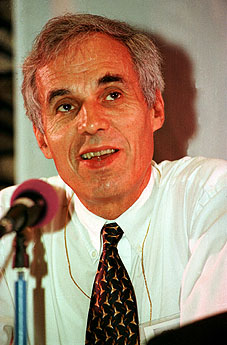![]()
 Click here to download the high-resolution picture free of charge (829 Kb). Please credit © Chris Black/WCC. |
Konrad
Raiser - Former WCC General Secretary (from 1993-2003) Biographical Information The Rev. Dr Konrad Raiser was born on 25 January 1938 in Magdeburg, Germany, and spent his childhood in Schwerin, Göttingen and Bonn-Bad Godesberg. After graduating from high school in Tübingen in 1957, Raiser spent six months working in a steel mill in Dortmund, in a programme organised by his church, the Evangelical Church in Germany (EKD). His father, a well-known professor of law, was for some years president of the national synod of the EKD. Raiser began studying theology in Tübingen in 1957, moving on to the theological school in Bethel, and later to the universities of Heidelberg and Zürich. He concluded his academic theological education in Tübingen in February 1963, was ordained in May 1964 and finished pastoral training in 1965. |
|
From April 1963 to August 1965, Raiser worked as an assistant pastor in the Evangelical Church in Württemberg including a period in industrial and social chaplaincy in Berlin. In 1965-66 he went to Harvard University in the US for additional studies in sociology and social psychology. Back in Germany, he worked from 1967-69 as a university assistant in practical theology at the Protestant theological faculty in Tübingen, earning a doctorate in theology in 1970 with a thesis on G.H. Mead's theory of interaction and its significance for theological anthropology. In March 1967, he married Elisabeth von Weizsäcker. The Raisers have four sons: Martin (1967), Ulrich (1970), Simon (1974) and Christoph (1978). In 1969, Raiser joined the staff of the World Council of Churches (WCC) in Geneva as study secretary in the Commission on Faith and Order. In 1973, he was appointed deputy general secretary, with responsibilities from 1979 as staff moderator of the Unit on Justice and Service. During this period, he participated in many ecumenical consultations, conferences and visits to churches. He was jointly responsible for the programmes of the 1975 and 1983 WCC Assemblies, held in Nairobi and Vancouver, respectively. Raiser returned to Germany in 1983 to take up a post as professor of systematic theology and ecumenics at the Protestant theological faculty of the University of the Ruhr in Bochum, at the same time serving as director of the faculty's Ecumenical Institute. Between 1983 and 1993, among other academic, church and ecumenical committee assignments, he served on the presidium of the German Protestant Kirchentag, and as chair of the editorial board of the quarterly Ökumenische Rundschau. He was both an adviser and member of the drafting committees at the European Ecumenical Assembly in Basle, Switzerland, in 1989, and the WCC's World Convocation on Justice, Peace and the Integrity of Creation in Seoul, Korea, in 1990. Raiser attended the WCC's Seventh Assembly in Canberra in 1991 as a delegate of his church. In August 1992, the WCC Central Committee elected Raiser as general secretary for a five-year term. He assumed his responsibilities in January 1993, and in September 1996 was re-elected for a second five-year term which ran until the end of 2002. Noting the press of business facing the Council due to probable changes to be recommended by the Special Commission, and other items, the Central Committee, meeting in Potsdam (Germany) in 2001, extended his term by one year to December 2003. Raiser holds honorary doctorates from the Budapest Theological Academy (1992) and the University of Geneva (1996). He is the author of four books. His most recent is To Be the Church - Challenges and Hopes for a New Millennium, published by the WCC in 1997. Before that he wrote Identität und Sozialität published in 1971, Ökumene im Übergang, published in 1989 (of which an English translation, Ecumenism in Transition, was published in 1991), and Wir stehen noch am Anfang - Ökumene in einer veränderten Welt, published in 1994. Since 1970, he has written numerous articles and essays on theological and ecumenical subjects, including four entries in the Dictionary of the Ecumenical Movement (WCC Publications, 1991), for which he was also a member of the editorial board. As general secretary of the WCC, he was editor of The Ecumenical Review. January 2004 Other pictures are available at Photooikoumene |